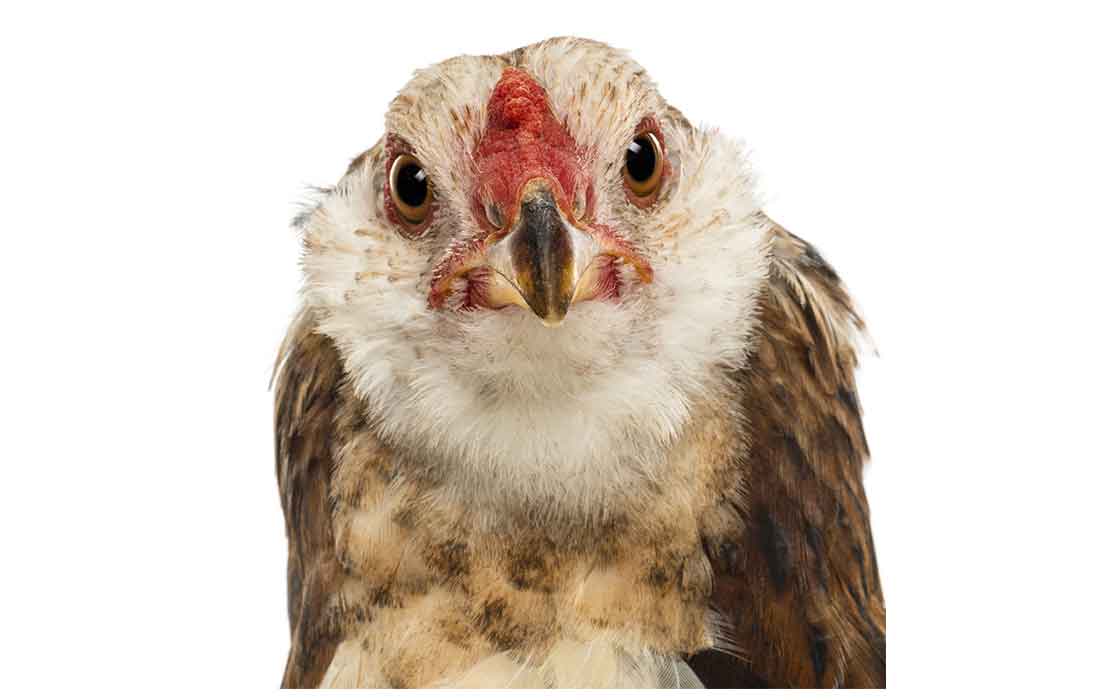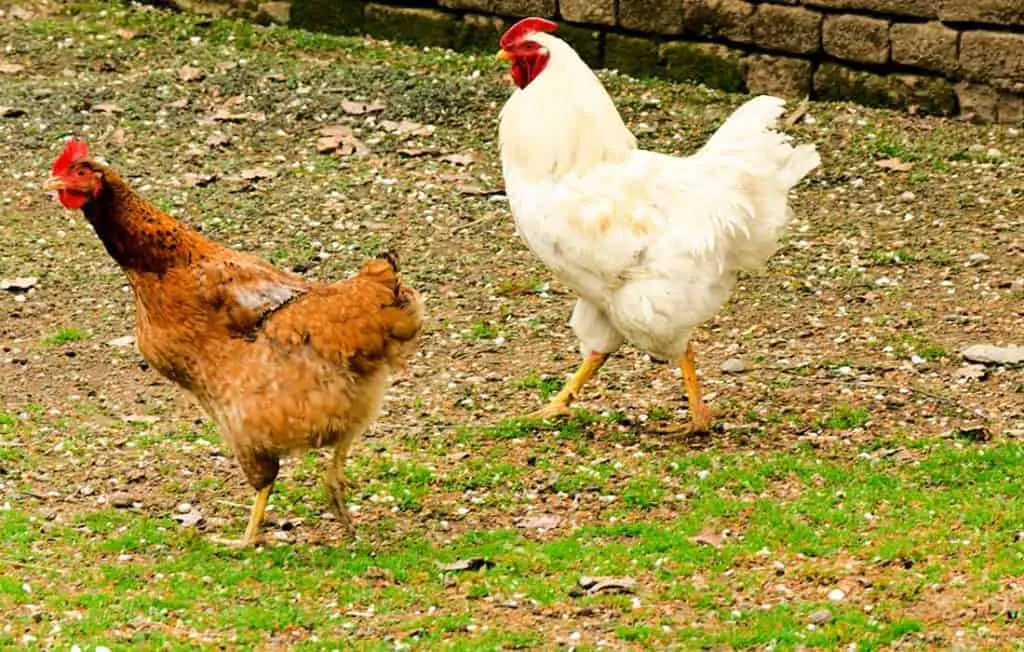You’re lounging around your farm, enjoying the cold air after a hard day’s work, and your chicken rushes over and starts rubbing his beak against you. It’s cute, but you can’t help but feel a bit worried; is he trying to tell you something? Is he hungry? Is he in pain?
Why Do Chickens Rub Their Beaks On You, Anyway?
The primary reasons that chickens rub their beaks on people and objects are to sharpen or shape them, mark their territory, groom themselves, etc. Please keep reading to help you understand which of these behaviors they are displaying.
Just like dogs and cats, chickens have unique behaviors, and quirks that make them a great pet.

This page contains affiliate links to products I recommend. If you purchase something from this page, I may receive a small percentage of the sale at no extra cost to you.
3 Reasons Why Chickens Rub Their Beaks on Things
If you’ve noticed your chicken rubbing his beak on you, there are three likely reasons. These include:
They’re Using You To Groom Themselves
Chickens heavily rely on the beaks for eating and defending themselves, which is why some chickens rub their beaks against you and other surfaces to clean, shape, and sharpen them.
Cleaning
According to ornithologist George A. Clark, Jr., bill-wiping or bill-cleaning involves a rapid withdrawal of the side of a bird’s beak from the base to the tip closely adjacent to a foreign surface, which includes branches, the ground, or, in this case, yourself.
He calls this behavior the “Napkin Principle.” Like us wiping our mouths with a napkin, a bird wipes or rubs his beak on certain surfaces to clean it. Dr. Clark’s research concluded that up to 90 species of birds engage in this activity, and yes, that includes chickens.
Clark noticed that most of the birds he observed wipe their bills after eating fruits, suets, and juicy insects. He believes that they do this for sanitation purposes. More than that, he thinks it may also help maintain bill streamlining and mobility.
Chickens are opportunistic feeders by nature, meaning they eat anything from worms and slugs to juicy fruits and greens. And sometimes, things get messy. They can’t help it. So, if your chickens wipe their beaks on you, one reason is that they’re using you (or your clothes) as a napkin to remove pieces of goo and food stuck on their beak.
Don’t take it personally. If anything, be glad! When your chickens engage in bill-wiping, this means that they’re happy enough to take care of themselves. They want to look good for you!
Shaping
A study conducted by the University of Bristol’s Department of Zoology states that bill running showed a significant effect on the chicken’s bill’s overlap and length, increasing foraging efficiency.
It meant that chickens rub their beaks to smooth and maintain their proper, pointed shape. Doing so allows them to strengthen their beaks and prevent future injuries.
However, if you’ve noticed your chicken rubbing his beak far too often than what you’d consider normal, it’s best to provide him with his unique pedicure perch. A chicken pedicure perch acts like a nail file; it naturally maintains the shape of his beak and claws.
Related: Do Chickens Have Nails or Claws?
To prevent sores and calluses on your chicken’s feet, make sure that the chicken pedicure perch you’re buying is made with rope and other soft material.
Sharpening
Similar to cats, chickens rub their beaks on objects and surfaces to sharpen it. Dr. Clark explains that this sharpening process is called honing. He wrote that honing is essential to bill growth because it offsets its wear as the chicken ages.
At the time, not enough is known to correlate bill-wiping to bill-honing.
Today, several studies conclude that chickens rub their beaks to keep them sharp for easier pecking.
Just like human hair and nails, a chicken’s beak and talons continuously grow. When a chicken’s beak doesn’t naturally wear down through the process of scratching and pecking, he’ll wear it down himself by rubbing it against certain surfaces.
In this context, we may conclude that your chicken might be using you as a sharpener to sharpen his beak!
They’re Marking You As Their Own

A preening chicken rubs his beak against the oil gland at the base of his tail, which in turn releases the smell of preen oil on whatever he wiped his beak against later on.
So, when your chicken rubs his beak against you, your chicken is exuding his cologne on you. His scent glands release a unique odor that you can’t smell but may be detected by potential chicken mates and rivals.
It doesn’t mean that your chicken wants you to be your mate or rival; instead, he may be rubbing against you to mark you as his own. You may not know this, but chickens recognize up to 100 human faces. It doesn’t take them a long time to recognize who the lovely person who’s feeding them every morning is.
Chicken owners understand this, which is why so many of them give them a name. They know that with consistent training, a chicken can learn its name.
In this scenario, he may be warning other chickens that you’re his because he smells like you. He might either want you himself or want to make other chickens jealous of him.
If you own a cat, this behavior might be familiar to you. When cats rub against objects, they’re transferring their scent onto it to claim ownership. The same goes for chickens!
They’re Showing Territorial Aggression
Some chickens rub their beaks against their owners as a sign of aggression, especially when their tempers are high. It’s similar to when a bull stomps his feet or when a cat puffs up his fur.
You’ll easily be able to tell if your chicken is rubbing his beak against you lovingly or in an aggressive show of territory. For one, if your chicken does the latter, it’ll hurt!
If you suspect your chicken is rubbing his beak against you or anything, you can use training techniques to establish trust and positive associations as a territorial gesture. Teach him that you’re the alpha, and he’s meant to follow you and your orders.
How to Tell if Your Chicken Is Happy
If your chicken rubs his beak against you, there’s a high chance that he’s happy, healthy, and content. If you’re curious to know more about chicken behavior, here’s a list of things happy chickens do and the actions they show in no particular order!
High Activity
Happy chickens are active! They love roaming and looking around in all sorts of nooks and crannies. Happy, healthy birds are confident, strong, and productive.
You can tell that your chickens love you if they run to greet you when you show up to feed them. It means that they have accepted you as part of the flock and are comfortable around you. You’ll also notice that they “purr” or “trill” when they’re content and happy, especially if you’re around.
On the other hand, unhappy or ill chickens are dull, lazy, and tend to stand still or stare into corners. Scared chickens will try to hide or run away.
Shiny, Healthy Feathers
Vibrant, healthy feathers have a sheen that gives chickens a sleek appearance that protects birds from the sun, rain, and other weather conditions. If your chicken’s feathers are healthy, this is a sure chance that they’re thriving in your care.
Dust Bathing
Happy chickens will scratch around in the grass, lay under the sun, or bathe in the dirt.
You can tell they’re happy because they’re comfortable enough to partake in such activity during their spare time, especially when they do it together. Chickens are flock animals, meaning they love being around each other and doing things with one another. Doing so strengthens the bond of the pecking order.
Wrapping Up
There are many reasons why chickens rub their beaks on you. The most common cause is grooming purposes; they’re cleaning, sharpening, and shaping their beaks against you or your clothes. Another reason might be because they love you and want to mark you as their own, similar to what a cat does around its owner!
Related Articles
